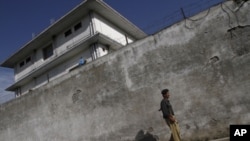U.S. lawmakers on Wednesday demanded to know what Pakistan authorities knew about Osama bin Laden and the terrorist leader's hideout in a large compound near a Pakistani military academy. Legislators of both major political parties acknowledged Pakistan's strategic importance to the United States, but said trust between Washington and Islamabad cannot be sustained without a full accounting of how bin Laden managed to live in relative comfort in Pakistan for so long.
After two days of closed-door intelligence briefings on the killing of Osama bin Laden by U.S. Special Forces, Democratic and Republican senators urged Pakistan to provide answers, and soon.
Arizona's John McCain is the ranking Republican on the Senate Armed Services Committee:
"We need to find out what the extent of knowledge was about Osama bin Laden's presence there," said McCain.
Democratic Senator Claire McCaskill of Missouri put it more bluntly.
"There are questions that have to be asked and answered," said McCaskill.
And the answers Pakistan provides could shape U.S.-Pakistani relations, according to Republican Senator Kelly Ayotte of New Hampshire.
"Given where the [bin Laden] compound was located, and it's eight times the size of any other homes in that area, one of two things we have to say: were the Pakistani officials incompetent or were they, obviously, aware of the compound and not providing us that information? This is a very important question for our relationship with Pakistan. We need to get the facts and really reset our relationship, and have those tough conversations with Pakistan going forward," said Ayotte.
Pakistan's prime minister has characterized bin Laden's seeming ability to hide in plain sight near Islamabad as a worldwide intelligence failure, not just Pakistan's. He said no single nation can fight terrorism alone, and he has described his country as part of the solution, not the problem.
U.S. civilian and military aid to Pakistan has totaled nearly $20 billion during the last decade. Democratic Senator Barbara Mikulski of Maryland said she long questioned whether the money was well-spent.
"I have been concerned about Pakistan [for] some time," said Mikulski. "Apart from what did they know about bin Laden and his living next door to their equivalent of West Point [the United States Military Academy], their squandering of our foreign aid through cronyism and corruption, rather than empowering and lifting up their own people is deeply troubling."
Senator Ayotte said she will take a wait-and-see approach on future U.S. aid to Pakistan.
"I think the facts [on bid Laden] have to come out before we can really look at anything about the aid issue," added Ayotte.
While seeking answers from Pakistan on Osama bin Laden, Senator McCaskill stressed that larger, more consequential matters are at stake in the U.S.-Pakistan relationship.
"We have to be really careful here," noted McCaskill. "We have to go through Pakistan to supply our troops [in Afghanistan]. They have nuclear capability. They are in a very dangerous part of the world, and we have thousands of men and women at risk in Afghanistan right now. So I just think that we need to be very calm and deliberative."
That sentiment was echoed by Senator McCain.
"There have been a number of areas where we have received significant cooperation from the Pakistanis as well," added McCain. "They are a nation with a nuclear arsenal, which complicates our relationship and our approach to Pakistan. So it is a very complicated situation. But first, I think it is important we find out whether the Pakistanis had knowledge of Osama bin Laden being located where he was."
Lawmakers in the House of Representative are also speaking up on the bin Laden issue. The chairman of the House Committee on Homeland Security, Republican Peter King, said "it is very hard to believe" that Pakistani authorities had no knowledge of bin Laden's whereabouts. King added that U.S.-Pakistan ties are important, but that the relationship changed as of Sunday, when Osama bin Laden's death was announced.




